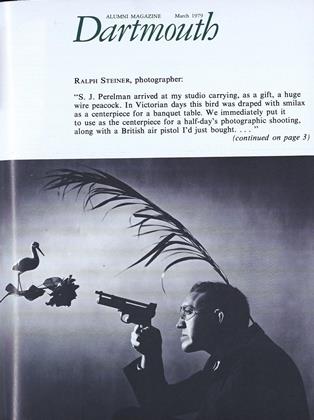Not all students saw Winter Carnival as a time to party this year. Two rallies were held on Friday of the holiday: one to show support for an equal-access admissions policy and one to protest the College's investments in corporations with assets in South Africa.
A quiet crowd of 300 was present for the equal-access "convocation" held at the center of the Green. Adam Eisgrau '80 stressed that the gathering was not a protest of past Trustee action but a show of student support for a sex-blind admissions policy. He urged students to find a "common ground" between apathy and radical protest.
The second rally of the day was not so conciliatory. Nearly 60 students marched from Parkhurst Hall to Cutter Hall for a mock funeral in symbolic protest of Dartmouth's holdings in corporations doing business in South Africa. The protesters, dressed predominantly in black, gathered around a black casket for the walk to Cutter Hall. The event was held to point out that funerals are often the only place that South African blacks can hold political meetings, according to Don O'Bannon '79. O'Bannon is treasurer of Alpha Phi Alpha fraternity, one of the sponsors of the protest. Referring to apartheid, Professor William Cook of the English Department said, "We not only can, but we have a responsibility to stop these machines. Perhaps it is time for us to do something that is irrational."
Later in February, a petition begun by the organizers of the equal-access rally was included on the agenda of the Trustee Committee on Student Affairs; elsewhere, the Upper Valley Committee for a Free Southern Africa presented a report on Dartmouth's economic involvement with apartheid at a forum on divestiture held at the Collis Center.
The Upper Valley committee presented the case for divestiture in a detailed 128 page report. Howard Hawkins '75, a member of the group, claimed that the College would do better financially if its endowment were placed in the public sector. He suggested, for instance, that high yields from investments in such areas as the Federal Housing Administration would provide better return than the College's current portfolio. "I can say for sure the College's investments are doing poorly," he said. College officials disagree.
 View Full Issue
View Full Issue
More From This Issue
-
 Feature
FeatureNine to Midnight (or two if hot)
March 1979 By Shelby Grantham -
 Feature
FeatureSTEINER: by himself
March 1979 -
 Books
BooksNotes on lost causes and an enlistment against Nature, as brave as it was brief.
March 1979 By R. H. R. -
 Article
ArticleWinter Carnival Blues
March 1979 By Biĺ Conway '79 -
 Article
ArticleLiberal Learner
March 1979 By M.B.R. -
 Class Notes
Class Notes1974
March 1979 By STEPHEN D. SEVERSON
Article
-
 Article
ArticleSECRETARIES MEET IN APRIL
February 1921 -
 Article
ArticleCommencement Fares
June 1934 -
 Article
ArticleNomination of Trustee
March 1947 -
 Article
ArticleROTC Does Not Belong At Dartmouth
NOVEMBER 1991 -
 Article
ArticleHaving It All
Sept/Oct 2006 By Judith Hertog -
 Article
ArticleNo Cut Problem—in Utopia
March 1949 By PROFESSOR JOHN HURD '21


